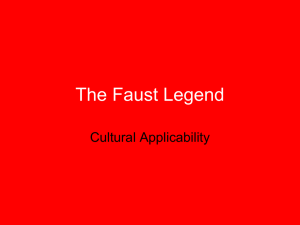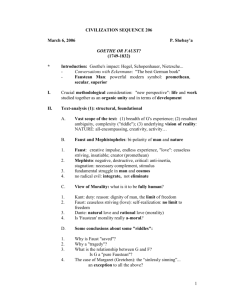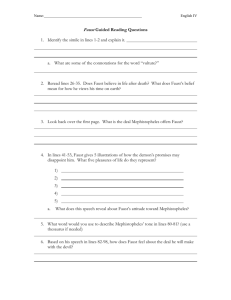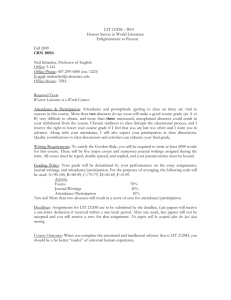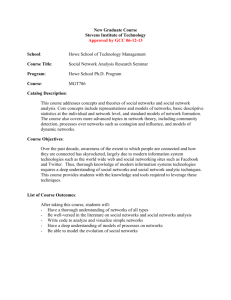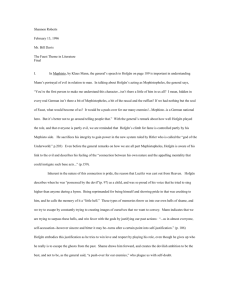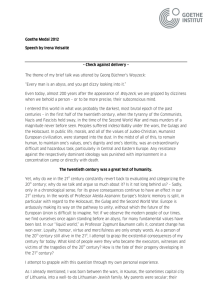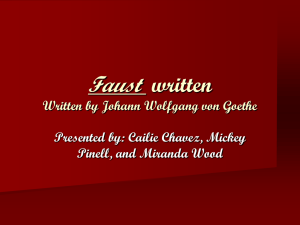from Faust, Part 1 by Goethe
advertisement
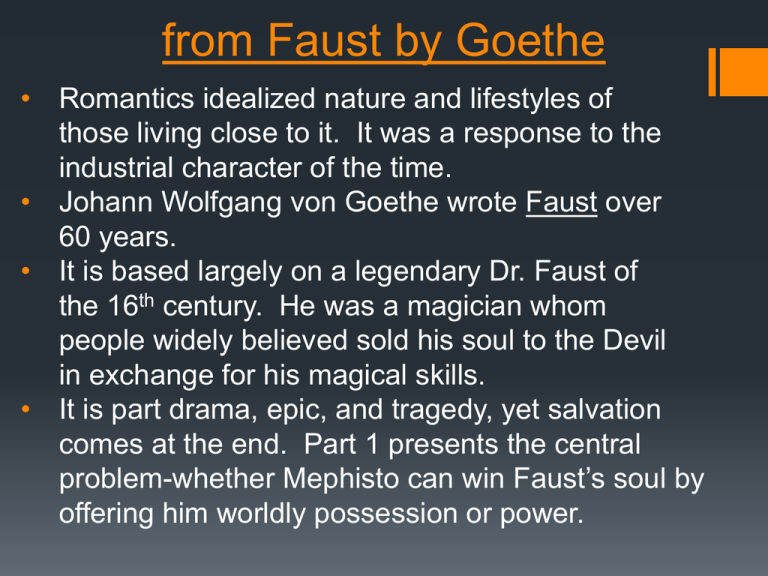
from Faust by Goethe • Romantics idealized nature and lifestyles of those living close to it. It was a response to the industrial character of the time. • Johann Wolfgang von Goethe wrote Faust over 60 years. • It is based largely on a legendary Dr. Faust of the 16th century. He was a magician whom people widely believed sold his soul to the Devil in exchange for his magical skills. • It is part drama, epic, and tragedy, yet salvation comes at the end. Part 1 presents the central problem-whether Mephisto can win Faust’s soul by offering him worldly possession or power. Prologue in Heaven 1. Mephisto is addressing God. It is a casual conversation between them. 2. Man is the small god of the world. Mephisto views humanity as unhappy, loathsome, and stupid. 3. Man is compared to a cicada. Man makes the same mistakes all the time. 4. Faust is not satisfied on earth and he has no peace in his life. 5. A metaphor is used. The gardener is the Lord. The tree is Faust (humanity), and the bloom and fruit represent a person’s faith and goodness. 6. Mephisto bets that he can win Faust’s soul if the Lord will let him try. 7. Faust’s dissatisfaction with life on earth and his desire to attain all that heaven has to offer suggest that he may be willing to sell his soul. 8. A cat likes to hunt and trap a mouse. Then the cat often plays with the mouse before killing and eating it. 9. The Lord believes that Faust is a good man and will choose the “right road” (line 59). 10. A soliloquy is used to Mephisto’s disrespect toward the Lord. Faust’s Study 1. Mephisto is sarcastic and mocking towards both of them. He shows some deference to the Lord but he shows little respect towards Faust. 2. Faust is in despair and willing to sell his soul to the devil for the chance to advance his knowledge. 3. Faust distrusts Mephisto and believes that the devil wants something in return for his services. 4. Mephisto states his terms. I will be your slave on earth but I will have your soul in the afterlife. 5. Faust challenges Mephisto to produce food that does not satisfy hunger and fruit that rots before it can be picked. Faust wants to see these things because they are beyond the limits of human knowledge. 6. If I ever grow lazy, you may kill me. If your flattery should make me become too pleased with myself or if I become attracted by pleasure, then you may seize my soul. 7. He wants it down in writing. Faust is a man of honor and does not need to put it down in writing. 8. Faust is using sarcasm to indicate politely that the choice of writing instruments is up to Mephisto. Faust is mocking the devil for his pettiness. 9. Mephisto uses blood to symbolize the seriousness of the pact and create a strong bond between them. 10. Faust wishes to learn everything and feel everything-even experiences that cause pain or distress. 11. Hyperbole is used to emphasize Faust’s deep desire to learn everything within heaven and earth. Faust would be willing to do anything to gain this knowledge. 12. Mephisto does not take Faust seriously. Mephisto does not think it’s possible for Faust to achieve his goals. 13. Mephisto will tempt Faust with all life has to offer but without satisfying any of his real desires. 14. Mephisto has nothing but contempt for Faust. When Mephisto made the deal with Faust, he was friendlier and more sympathetic.
